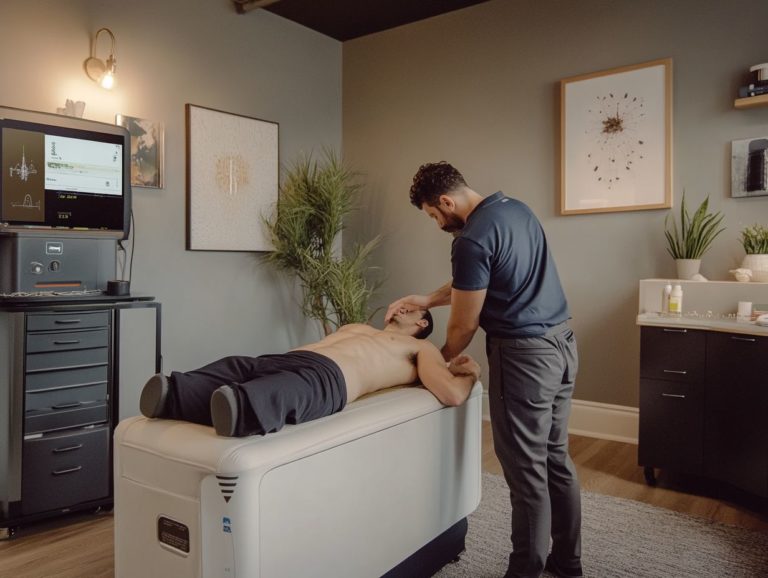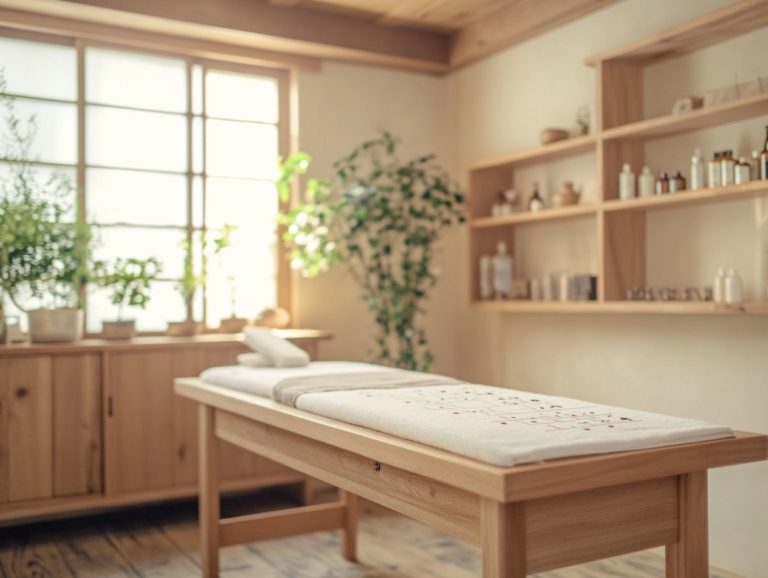The Relationship Between Acupuncture and Stress Reduction
Acupuncture is an ancient practice that s making waves in modern wellness circles, particularly for its remarkable effects on stress reduction.
This article delves into the rich history and principles behind acupuncture. It explores how it alleviates stress and the research that supports its numerous benefits. You will also discover how acupuncture can aid in pain management and improve sleep quality.
You will learn how to prepare for your first session and pick the right acupuncturist to suit your needs.
Uncover how acupuncture can beautifully complement other stress-reduction techniques, transforming it into a versatile tool for enhancing your overall well-being.
Discover the incredible benefits acupuncture offers for your well-being!
Contents
- Key Takeaways:
- The Basics of Acupuncture
- The Effects of Acupuncture on Stress
- Understanding Acupuncture and Stress
- Other Benefits of Acupuncture
- Preparing for an Acupuncture Session
- Choosing an Acupuncturist
- Combining Acupuncture with Other Stress-Reduction Techniques
- Frequently Asked Questions
- What is the relationship between acupuncture and stress reduction?
- How does acupuncture help reduce stress?
- What are the benefits of acupuncture for stress reduction?
- Is acupuncture safe for stress reduction?
- How often should I get acupuncture for stress reduction?
- Are there any side effects of acupuncture for stress reduction?
Key Takeaways:

Acupuncture has been used for centuries and is based on the principles of Traditional Chinese Medicine. Acupuncture can reduce stress by promoting relaxation, releasing endorphins, and balancing the body’s energy flow. Research suggests that acupuncture can also provide relief from pain and improve sleep.
Before an acupuncture session, it is important to know what to expect and to prepare accordingly. When choosing an acupuncturist, factors to consider include their credentials, experience, and communication style.
Combining acupuncture with other stress-reduction techniques, such as meditation or yoga, can enhance its effectiveness.
The Basics of Acupuncture
Acupuncture stands as a cornerstone of Traditional Chinese Medicine, anchored in the ancient belief that optimal health arises from the unobstructed flow of energy, or Qi (pronounced ‘chee’), within the body s intricate energy pathways.
This holistic approach entails the precise insertion of fine needles at designated acupuncture points, stimulating and harmonizing the body s natural energy to enhance overall well-being.
With a practice that has endured for thousands of years, acupuncture is celebrated not just for its rich historical roots but also for its extensive health benefits, such as pain relief, enhanced emotional wellness, and decreased inflammation.
History and Principles
The history of acupuncture stretches back over 2,000 years, originating from the rich tapestry of Traditional Chinese Medicine. At its core lies the principle of balancing Qi and recognizing the intricate interconnections within the body s systems.
This ancient practice is built on the belief that true health arises from the harmonious flow of vital energy, or Qi, through the body’s energy pathways. Acupuncture practitioners employ fine needles to stimulate specific points, facilitating the release of blocked energy and fostering overall well-being.
This therapeutic approach is remarkable because it has transcended its Eastern roots, carving out a significant space in Western medicine and highlighting its cultural importance. Acupuncture is evolving by integrating modern techniques while honoring its foundational principles, ultimately enhancing therapeutic outcomes for a variety of health conditions.
The Effects of Acupuncture on Stress
Acupuncture can dramatically reduce your stress levels by directly addressing your body s stress response and enhancing emotional health through a series of physiological changes.
Research demonstrates that acupuncture treatments can effectively regulate cortisol levels, reduce anxiety, and elevate your overall mental well-being.
By targeting specific acupuncture points, this therapy stimulates the release of neuropeptide Y, a key player in stress management and heart rate variability. This process ultimately helps you cultivate a more balanced state of mind.
Understanding Acupuncture and Stress
Acupuncture offers a powerful means to reduce stress by affecting your body’s stress response. This practice fosters relaxation and cultivates a profound sense of well-being.
As you engage with this ancient healing method, you’ll find it influences the release of neurotransmitters and hormones, guiding your body from a state of tension to one of calm and balance. With precise needle placements, many patients report a significant reduction in symptoms such as anxiety and emotional distress.
Research backs this up, demonstrating that regular acupuncture sessions can amplify these positive effects, resulting in substantial improvements in your overall mental health. Testimonials from individuals reveal that consistent treatment not only alleviates immediate stress but also nurtures long-term resilience, enabling you to navigate life s challenges with greater ease!
Research and Evidence

Numerous research findings underscore the effectiveness of acupuncture in addressing stress-related disorders. Clinical trials showcase its remarkable ability to reduce stress levels and enhance patient outcomes.
In various studies involving diverse populations, acupuncture has proven particularly beneficial in alleviating symptoms linked to anxiety and depression, ultimately improving overall emotional well-being.
For instance, a significant trial involving young adults demonstrated that regular acupuncture sessions resulted in notable reductions in perceived stress.
Another study on older adults showed its ability to prevent chronic stress-related issues.
Practitioners emphasize that acupuncture is not merely a viable alternative treatment; it also beautifully complements conventional therapies.
This holistic approach to stress management appeals to individuals across different age groups and health profiles, making it a compelling option for anyone seeking to improve their mental well-being.
Other Benefits of Acupuncture
Along with alleviating stress, acupuncture presents a wealth of health benefits that you may find particularly compelling.
It serves as an effective means of pain management, enhances the quality of your sleep, and provides relief from a variety of health disorders. This therapeutic practice stimulates the release of endorphins your body s natural painkillers while also working to reduce inflammation.
As a result, it becomes a valuable ally in your holistic treatment strategies.
Pain Relief and Improved Sleep
Acupuncture has earned a well-deserved reputation for its remarkable effectiveness in providing pain relief, primarily due to its ability to stimulate the release of endorphins while simultaneously reducing inflammation.
This ancient practice goes beyond just alleviating physical discomfort; it plays a vital role in addressing issues like chronic pain and insomnia. By promoting a natural healing response, acupuncture helps regulate neurotransmitters that can significantly influence both mood and pain perception.
Consider the case of a patient grappling with debilitating back pain after several sessions, they found considerable relief, not only experiencing reduced discomfort but also enjoying improved sleep quality.
Similarly, individuals struggling with insomnia have shared how regular acupuncture treatments allowed them to fall asleep more quickly and enter a deeper, more restorative sleep.
Preparing for an Acupuncture Session
Preparing for your acupuncture session means understanding what to expect during the treatment and how to effectively gear up for your appointment to maximize its benefits. Arriving relaxed and informed is essential, as it greatly enhances the success of your therapeutic experience.
Try acupuncture today and experience the benefits for yourself!
What to Expect and How to Prepare
During an acupuncture session, anticipate a serene and therapeutic atmosphere where skilled practitioners assess your needs and guide you through the treatment journey.
The session typically begins with a thorough consultation, allowing the practitioner to review your health history, address your concerns, and pinpoint specific symptoms.
Once that s established, you ll find yourself in a comfortable setting, softly lit and accompanied by soothing music, all designed to promote relaxation. As you lie on the treatment table, tiny needles are gently inserted at precise points; you might feel a slight pinch or tingling sensation, which is part of the experience.
Wear loose-fitting clothing for comfort and come well-hydrated. The tranquility of your treatment environment is essential; it significantly alleviates anxiety and fosters a profound sense of well-being.
Choosing an Acupuncturist

Selecting the right acupuncturist is a pivotal step in securing effective treatment, as their qualifications and experience can profoundly influence your outcomes.
As you embark on this journey, evaluate their credentials, training, and treatment approach to ensure you find the perfect match for your health needs.
Factors to Consider
When choosing an acupuncturist, keep several key factors in mind, such as their qualifications, areas of expertise, and approach to patient care.
Prioritize practitioners with accredited training in Traditional Chinese Medicine (TCM) and certifications from reputable organizations. This background ensures they have a solid foundation in both theory and practice.
Experience in treating specific conditions like chronic pain or digestive disorders is also crucial, as this specialization can greatly influence your treatment results.
Choose an acupuncturist who shares your health goals for a truly effective experience! This harmony not only enhances treatment effectiveness but also contributes to a more holistic healing journey tailored just for you.
Combining Acupuncture with Other Stress-Reduction Techniques
Combining acupuncture with other stress-reduction techniques can elevate your therapeutic experience, enabling you to adopt a holistic approach to mental health and well-being.
By integrating practices such as meditation, yoga, and mindfulness, you can create a powerful synergy that enhances your outcomes when facing stress-related disorders.
This comprehensive method addresses immediate concerns while fostering lasting resilience and balance in your life.
Complementary Practices
Complementary practices like meditation, yoga, and mindfulness can significantly enhance the benefits of acupuncture, creating a holistic framework for effective stress management.
These practices work seamlessly with acupuncture to cultivate a deeper sense of relaxation and emotional equilibrium. For instance, meditation fosters present-moment awareness, amplifying the soothing effects initiated by the acupuncture needles.
Yoga enhances physical flexibility and mental clarity, forging a harmonious connection between your body and mind. Mindfulness techniques enable you to identify and manage stress triggers, ultimately leading to a more resilient emotional state.
When combined, these modalities create a synergistic approach that magnifies the stress-reducing effects of acupuncture, contributing to your overall well-being and fostering a healthier mindset.
Frequently Asked Questions
What is the relationship between acupuncture and stress reduction?

The relationship between acupuncture and stress reduction is that acupuncture is a traditional Chinese medicine practice involving the insertion of thin needles into specific points on the body. This can help alleviate physical and emotional stress, leading to a reduction in overall stress levels.
How does acupuncture help reduce stress?
Acupuncture reduces stress by triggering the body’s natural healing processes. It promotes relaxation by releasing endorphins, which are natural chemicals that help relieve pain and stress.
What are the benefits of acupuncture for stress reduction?
Acupuncture offers many benefits for stress reduction! You may notice an improved mood, less anxiety, more energy, better sleep, and overall well-being.
It can also relieve physical symptoms of stress, like tension headaches and muscle pain.
Is acupuncture safe for stress reduction?
Yes! Acupuncture is usually safe when done by a licensed practitioner.
The needles are very thin and do not harm the body. Always inform your acupuncturist about any medical conditions or medications you are taking before treatment.
How often should I get acupuncture for stress reduction?
The frequency of treatments varies by individual. Some may benefit from weekly sessions, while others may need them just once a month.
Consult a licensed acupuncturist to find the right schedule for you!
Are there any side effects of acupuncture for stress reduction?
Acupuncture is generally safe with few side effects. Some people might experience mild bruising, soreness, or bleeding where the needles were inserted.
If you feel discomfort during or after treatment, let your acupuncturist know right away.






